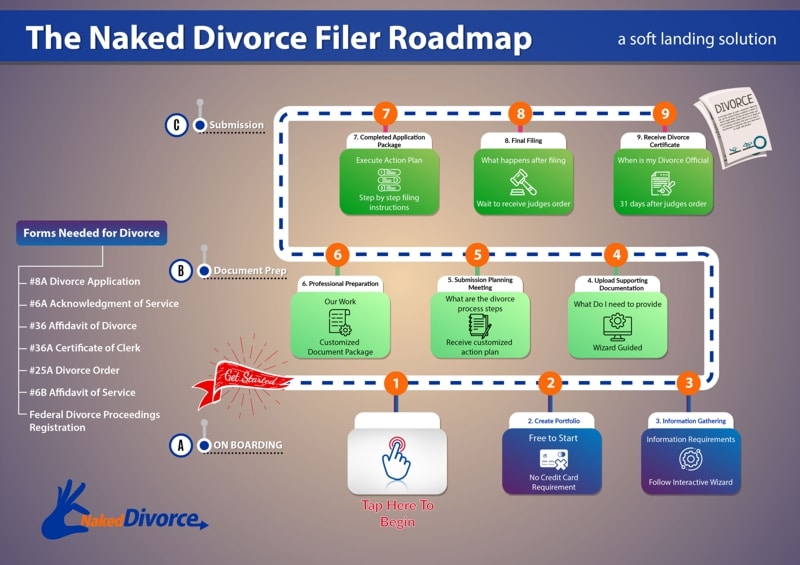Divorce can be one of the most stressful and overwhelming experiences in life, especially when you’re faced with the prospect of endless paperwork and the fear of court proceedings. If you’re navigating the complexities of divorce in Ontario, you’ve come to the right place. This comprehensive Ontario Divorce Guide will walk you through everything you need to know about the divorce process, with a special focus on how to achieve a peaceful, uncontested divorce that saves you time, money, and emotional energy.
In Ontario, 70% of divorces are settled outside of court, proving that there’s a simpler path forward. Whether you’re just contemplating divorce or ready to file your paperwork, this guide will provide the support and information you need to move forward confidently.
Understanding Your Options: The Ontario Divorce Process
Before diving into the specifics, it’s important to understand that the Ontario divorce process is governed by the federal Divorce Act, which sets out the legal framework for ending a marriage. The good news? You have more control over this process than you might think, especially if you and your spouse can work together.
Types of Divorce in Ontario: Why Uncontested is Your Best Option
In Ontario, there are two main types of divorce: contested and uncontested. Understanding the difference is crucial for planning your path forward.
Contested Divorce: This occurs when spouses cannot agree on one or more crucial issues like child custody, division of assets, or spousal support. These divorces often lead to lengthy court battles where a judge makes decisions on your behalf. They’re emotionally draining, expensive, and can take years to resolve.
Uncontested Divorce Ontario: This is your golden ticket to a smoother process. When both you and your spouse agree on all the terms of your divorce—whether it’s child custody, spousal support, or property division—you can file for an uncontested divorce Ontario. This approach is faster, more affordable, and allows you to maintain control over the outcome without a judge making decisions for you.
The beauty of choosing an uncontested divorce is that it keeps things civil and efficient. You’re not just saving money (thousands of dollars, in fact), but you’re also preserving your emotional well-being and potentially maintaining a more amicable relationship with your ex-spouse—something that’s especially valuable when children are involved.
Legal Requirements: What You Need to Know
Before you can proceed with your divorce, you’ll need to meet Ontario’s legal requirements. Don’t worry—they’re straightforward:
Residency Requirements
You or your spouse must have been a resident of Ontario for at least one year before filing for divorce. This ensures that Ontario courts have jurisdiction over your case.
Grounds for Divorce
In Canada, you need to prove that your marriage has broken down irretrievably. You can do this in one of three ways:
- Separation: Living separate and apart for at least one year (you can still live in the same house)
- Adultery: One spouse has committed adultery
- Cruelty: Physical or mental cruelty that makes living together intolerable
Most people choose separation as their grounds because it’s straightforward and doesn’t require proving fault. Remember, Ontario follows a “no-fault” divorce system, meaning you don’t need to assign blame for the marriage breakdown.
The Step-by-Step Ontario Divorce Guide
Let’s walk through the actual process of getting divorced in Ontario, focusing on the uncontested route that most couples find more manageable.
Step 1: Separation and Preparation
Once you’ve decided to divorce, you’ll typically need to wait out the one-year separation period. Use this time wisely to:
- Gather financial documents
- Discuss arrangements with your spouse
- Consider your children’s needs
- Explore mediation if you need help reaching agreements
Step 2: Creating a Separation Agreement
A separation agreement is your roadmap for the divorce. This legally binding document outlines:
- Division of property and debts
- Child custody and access arrangements
- Child support payments
- Spousal support (if applicable)
Working with a mediator or Certified Divorce Specialist (CDS) can help you create a fair agreement without the adversarial nature of court proceedings.
Step 3: Filing Your Divorce Application
Once your separation agreement is in place and you’ve met the one-year requirement, you can file your divorce application. The essential forms include:
- Form 8A: Application (Divorce)
- Form 36: Affidavit for Divorce
- Form 25A: Divorce Order (draft)
- Additional forms for child support if applicable
Step 4: Financial Disclosure
Both parties must provide complete financial disclosure. This transparency ensures fair division of assets and appropriate support arrangements. In Ontario, this follows the principle of equitable distribution—fair, but not necessarily equal.
Step 5: Finalizing Your Divorce
For an uncontested divorce, you typically won’t need to appear in court. Once the judge reviews your paperwork and finds everything in order, they’ll grant your divorce order. The whole process usually takes 4-6 months from filing to finalization—much faster than contested divorces that can drag on for years.
Division of Assets and Debts: Understanding Your Rights
The division of property during an Ontario divorce process can feel overwhelming, but understanding the basics helps you navigate it better. Ontario follows the principle of equitable distribution, considering:
- Marital Property: Assets acquired during the marriage (family home, vehicles, savings, retirement accounts)
- Non-Marital Property: Assets owned before marriage, inheritances, and personal gifts
- Contributions: Both financial and non-financial contributions to the marriage
The court also considers sacrifices made during the marriage, such as one spouse staying home to raise children or supporting the other through education. This ensures a fair outcome that recognizes both partners’ contributions.
Child Custody and Support: Putting Children First
When children are involved, their best interests always come first in Ontario family law. The court considers:
- The child’s physical, emotional, and psychological needs
- Each parent’s ability to care for the child
- The child’s relationships and connections
- Any history of family violence
Child support is calculated using federal guidelines that consider both parents’ incomes and the number of children. Remember, these arrangements are about ensuring your children’s well-being, not about winning or losing.
Spousal Support: Understanding Your Rights and Obligations
Spousal support isn’t automatic in Ontario divorces. The court considers several factors:
- Length of the marriage
- Roles during the marriage
- Each spouse’s financial circumstances
- Age and health of both parties
- Standard of living during the marriage
Ontario follows the Spousal Support Advisory Guidelines, which provide a framework for determining fair support amounts. Support can be temporary (to help during the transition) or longer-term, depending on the circumstances.
Why Mediation and Professional Support Matter
One of the best investments you can make during your divorce is working with professionals who can guide you through the process. Here’s why:
Mediation: Your Path to Agreement
Mediation involves a neutral third party who helps you and your spouse negotiate agreements. The mediator doesn’t make decisions but facilitates productive discussions. This process:
- Reduces conflict and stress
- Saves money compared to court battles
- Helps maintain better post-divorce relationships
- Gives you control over the outcome
Certified Divorce Specialist (CDS): Expert Guidance Without the Lawyer Fees
A Certified Divorce Specialist can be your secret weapon for navigating the Ontario divorce process smoothly. They provide:
- Expert guidance on filling out forms correctly
- Help avoiding common paperwork mistakes
- Support at a fraction of lawyer costs
- Peace of mind that you’re doing things right
CDSs are particularly valuable for uncontested divorces, where you don’t need the full services of a lawyer but still want professional guidance.
Common Mistakes to Avoid in Your Ontario Divorce
Learning from others’ experiences can save you time, money, and heartache. Here are the most common pitfalls:
- Incomplete Financial Disclosure: Hiding assets or failing to disclose all financial information can invalidate agreements and lead to legal consequences.
- Letting Emotions Drive Decisions: Divorce is emotional, but making decisions based on anger or hurt often leads to regret.
- Ignoring Tax Implications: Property division and support payments have tax consequences. Consider these in your planning.
- Not Prioritizing Children’s Needs: Using children as pawns or involving them in adult conflicts causes lasting damage.
- Rushing the Process: Take time to understand your rights and options before making major decisions.
- Going It Completely Alone: While you can represent yourself, having some professional guidance prevents costly mistakes.
Resources and Support for Your Journey
You don’t have to navigate this journey alone. Ontario offers various resources:
Government Resources
- Ontario Court Forms: Access official divorce forms through the Ontario Court Forms website
- Family Law Information: The Government of Ontario provides comprehensive family law resources
- Ministry of the Attorney General: Offers detailed guidance on divorce procedures and timelines
Emotional Support
- Support groups for divorced individuals
- Counselling services specializing in divorce
- Online communities where you can connect with others going through similar experiences
- Family justice services that provide information and referrals
Professional Support
- Mediators trained in family law
- Certified Divorce Specialists for document preparation
- Financial advisors for post-divorce planning
- Therapists specializing in family transitions
Moving Forward: Your Next Steps
Remember, choosing an uncontested divorce Ontario approach doesn’t mean you’re giving up or giving in. It means you’re choosing a path that prioritizes:
- Your emotional well-being
- Your financial future
- Your children’s stability
- Your ability to move forward positively
Take things one step at a time. Start by having an honest conversation with your spouse about the possibility of working together. Consider mediation if you need help reaching agreements. And don’t hesitate to seek support—whether emotional, legal, or practical.
Final Thoughts
Divorce marks the end of one chapter and the beginning of another. While it’s natural to feel overwhelmed, remember that thousands of Ontarians successfully navigate this process each year, many through the simpler path of uncontested divorce.
By choosing cooperation over conflict, seeking appropriate support, and focusing on fair solutions, you can emerge from this process ready to embrace your new future. This Ontario Divorce Guide is your roadmap, but remember—every divorce is unique. Take what applies to your situation, seek help when you need it, and be patient with yourself as you navigate this journey.
You’re stronger than you think, and with the right information and support, you can handle this. Take it one day at a time, and remember that this difficult period will pass, leading you to a new beginning.


















































